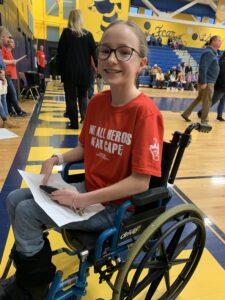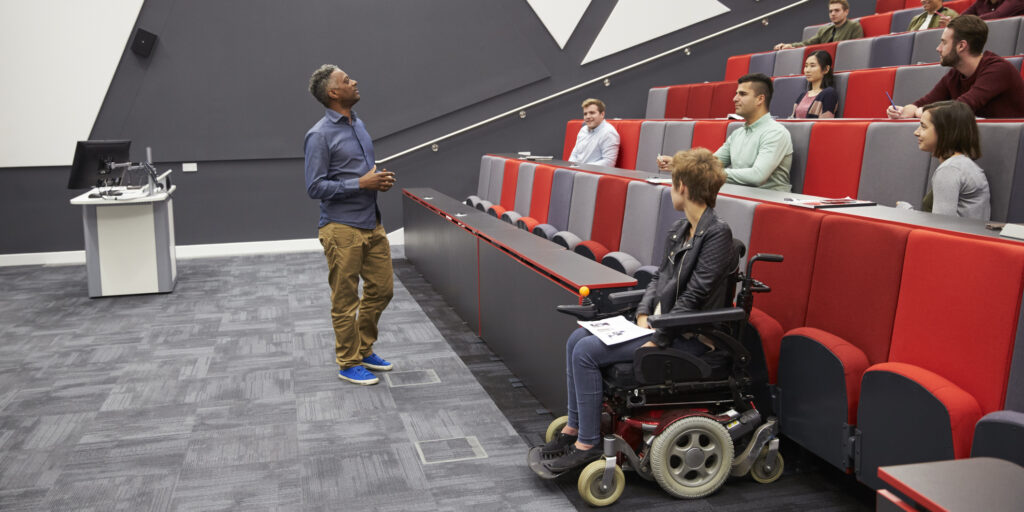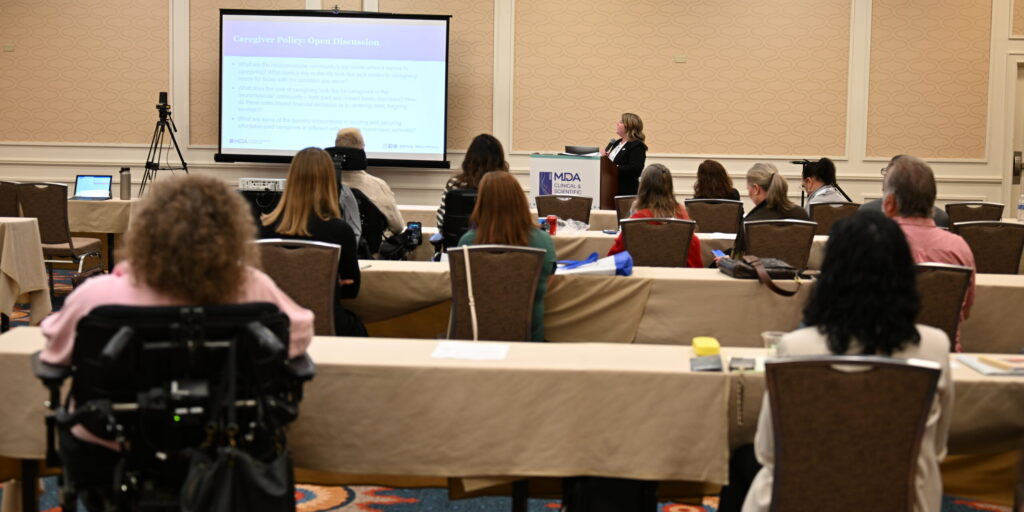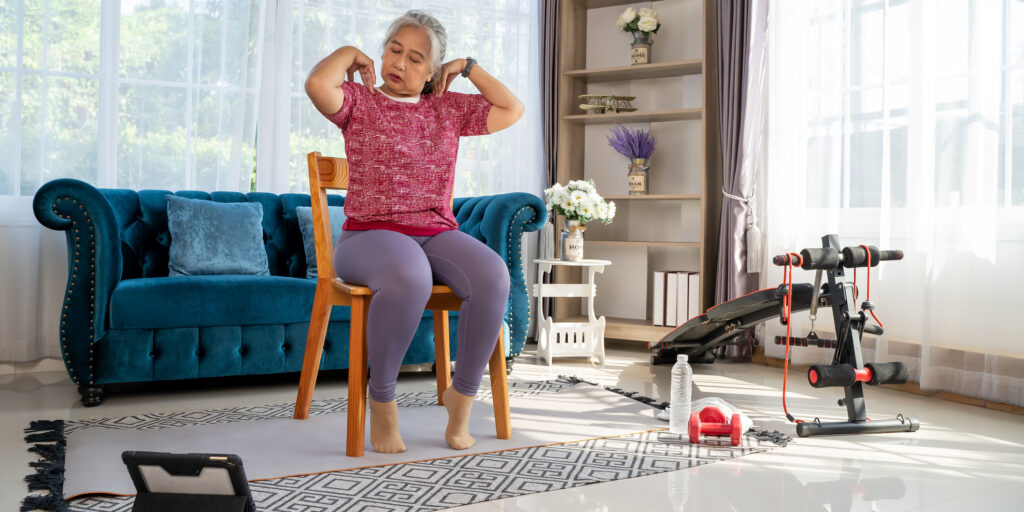
Life with Lily: The Right to Access My Education Fully
By Lily S | Thursday, August 21, 2025
5 Second Summary
MDA Ambassadors play an essential role in furthering MDA’s mission while representing and empowering the neuromuscular disease community. Quest Ambassador Guest Blog series provides a platform to share their personal stories, perspectives, and experience.
“Lily, I think you’re old enough now to advocate for yourself in your 504 meeting today.”
I remember my mom saying that like it was a small thing. It wasn’t. I was in middle school, nervous, unsure, and still coming to terms with the idea that having a disability meant I’d have to explain my needs to adults who didn’t always understand them. Sitting in that meeting, surrounded by teachers, staff, and administrators, I was expected to speak up for myself. I had to advocate not just for accommodations but for dignity, inclusion, and respect. That moment changed me.

Lily S. on the first day of school.
Advocacy did not begin for me in Congress or through campaigns. It started in a classroom. I had to raise my hand and say, “I need help,” or “This isn’t accessible for me.” At the time, those words felt exposing. I was afraid of being a burden. I was afraid of being different. I was afraid of being told no.
But with each conversation and meeting, I slowly began to understand something important. I had the right to access my education fully. I had the right to be supported. I had the right to be included. I had the right to take up space. That understanding helped me build confidence. Things did not necessarily get easier, but I started to believe I deserved to be heard.
Advocacy in school often looked quiet. Sometimes it meant emailing a teacher who forgot to provide me with note-taking support. Sometimes it meant setting up a meeting with my 504 coordinator because my accommodations needed to be tweaked. Sometimes it meant crying in frustration and then showing up again the next day. It was uncomfortable, imperfect, and at times discouraging, but it was always powerful.
The more I advocated, the more I realized I was not just speaking for myself. I was also challenging systems and expectations that were never created with disabled students in mind. Every time I raised my voice about an inaccessible practice, I was doing something that helped more than just me. I was creating the possibility of change for the next student.
Advocacy in education matters because too often schools are not set up with disabled students in mind. Accessibility is treated as a side issue instead of a foundation. When students speak up and say, “This isn’t working for me,” or “I need this to learn,” they are helping shift the idea of who belongs in a classroom.
This does not only benefit students with disabilities. Inclusive practices create better learning environments for everyone. When a school commits to accessibility, it fosters a culture of belonging for all students.
Advocacy is important, but it is also difficult. One of the most frustrating parts of being a student with a disability is having to prove your needs over and over again. Even though there are legal protections like Section 504 of the Rehabilitation Act and the Individuals with Disabilities Education Act, those laws are not always followed consistently. That inconsistency can leave students feeling exhausted.
Some educators do not fully understand disability law. Some administrators push back on accommodations because they are focused on fairness or budgeting. Even when a student has a 504 Plan or an IEP, there can still be gaps in support.

Lily S. at a school function.
This is why it matters to learn your rights. When I started understanding the legal framework behind accommodations for students with disabilities, I felt more confident in meetings. I realized that my 504 Plan was not a favor from the school. It was a right protected by law. Knowing that changed how I showed up in those spaces.
If you are a student with a disability, or a parent raising one, I want you to know this: your voice matters. You deserve to be heard in every room. You deserve to learn in an environment where you feel supported and respected.
To students, you do not need to know all the right words to begin. It is okay to be unsure. It is okay to feel nervous. Start where you are. Ask questions. Speak up when you can. What you are asking for is not special. It is essential.
To parents, support your child in learning to speak for themselves. Give them space to practice. Let them try. Be there when they stumble. Help them build the confidence to walk into a room and believe that they deserve to be there.
I still think about that first 504 meeting. I remember how anxious I felt and how proud I was afterward. That day, I was not just a student with a disability. I was someone discovering my voice, learning to advocate, and beginning to understand that I had a right to take up space.
Advocacy is not always big or dramatic. Sometimes it is small. Sometimes it is repetitive. Sometimes it is incredibly hard. But each time you speak up, you help shape a world that is more inclusive and more just. You make it a little easier for the next person.
And that, to me, is worth everything.
Next Steps and Useful Resources
- Read more about your 2024 National Ambassador, Lily, here.
- Read more about Lily’s Advocacy and her Passions.
- For more information about Charcot-Marie-Tooth disease (CMT), a full list of symptoms and causes can be found here.
- MDA’s Resource Center provides support, guidance, and resources for patients and families, including information about exon skipping therapies, open clinical trials, and other services. Contact the MDA Resource Center at 1-833-ASK-MDA1 or ResourceCenter@mdausa.org.
- To hear when MDA Advocacy shares new opportunities to support policies that strengthen educational access and disability rights, join us !
- To learn more about MDA’s Young Adult Programs, visit here.
- Read more about MDA Advocacy’s Education Policy Efforts here.
- MDA’s Resource Center provides support, guidance, and resources for patients and families. Contact the MDA Resource Center at 1-833-ASK-MDA1 or ResourceCenter@mdausa.org
- Stay up-to-date on Quest content! Subscribe to Quest Magazine and Newsletter.
Disclaimer: No content on this site should ever be used as a substitute for direct medical advice from your doctor or other qualified clinician.




